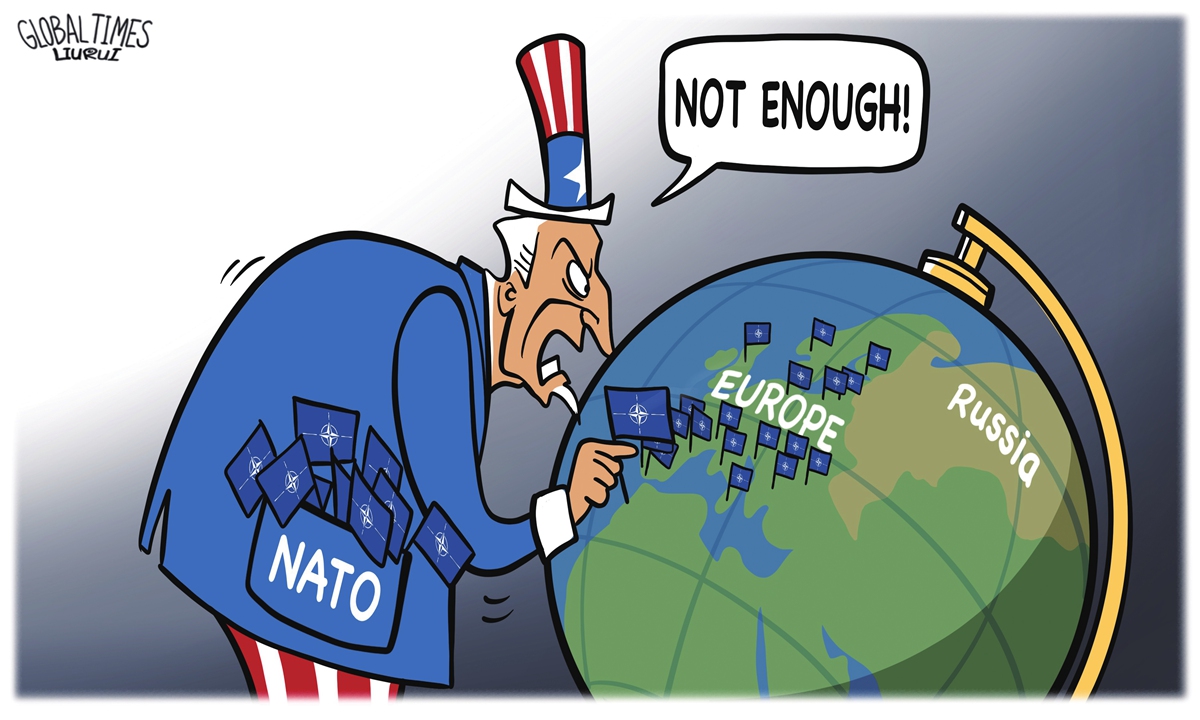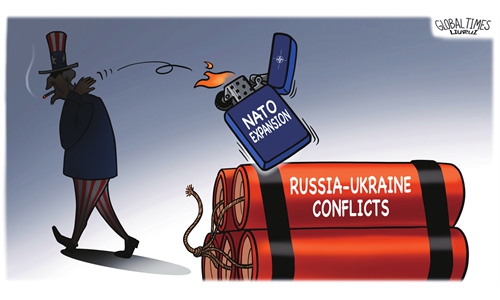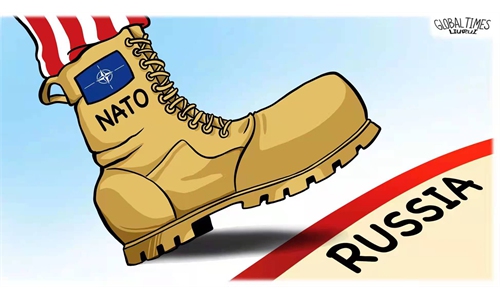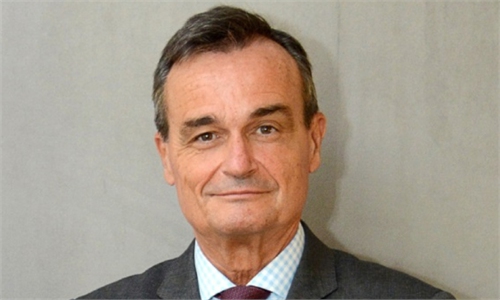
Illustration: Liu Rui/GT
Pro-NATO advocates usually argue that every country has the right to freely decide its security policy and that NATO has not expanded but only accommodated countries that wanted to join it.Of course, sovereign states have such a right. But the important question is: How freely did the 10 former Warsaw Pact members who are now NATO members actually decide? NATO has given them promises about Euro-Atlantic integration, trained their forces, carried out security sector reform work, invited them to Partnership for Peace, to exercises, meetings, etc.
NATO opened its first office in Kiev, Ukraine in 1994 and stated formally in 2008 that Georgia and Ukraine would become members of NATO.
Beyond such wooing, alternatives to NATO membership have hardly been discussed - it was either membership or being alone, helpless.
In a real democracy, various scenarios would be outlined followed by a fair public discussion and, finally, a referendum. And such an important binding decision would require 75 percent "''yes."
None of these criteria have been met. No referendums were ever held. To put it crudely, NATO has behaved like a charming, generous crocodile. But for a purpose.
The Russia-Ukraine conflict has provided a pretext for an intense debate in Finland and Sweden about abolishing their non-aligned status and joining NATO. Some argue that "we can no longer stand outside" the whole security architecture and these countries will soon "be swallowed by Russia like Ukraine now is." Hysteria and emotionalism abound.
Others are of the opinion that non-aligned status lends more freedom and independence and that NATO membership means less sovereignty and just following a NATO flock. They favor soft borders down through Europe instead of hard ones where Russian and NATO soldiers kind of look each other in the eyes like at the border between North and South Koreas.
Sweden shows a good example of how the US/NATO option has developed incrementally over the last 30 or so years. Decades ago, Sweden dropped its classical foreign and security policy such as the status of neutrality, common security, a strong UN, a critical stance against big bully wars on small states, active mediation in conflicts, disarmament and peace.
Shortly after prime minister Olof Palme (1927-86) was killed, the country began to move down the road to complete US loyalty and NATO membership. It abandoned every attempt at conducting a principled, independent research-based policy and playing an important role in the wider world. Independent thinking and creative politics disappeared.
One reason had been the famous "Whisky-On-The-Rocks" Russian U-137 submarine that suddenly, on one morning in October 1981, sat on a rock close to the Karlskrona Naval Base. Naturally, it was perceived as a Russian accident or provocation but recent research has documented that it was, in reality, a US-UK Psychological Operation aimed at showing Sweden that its defense against Russia was weak and US/NATO path necessary.
Today, the Swedish security policy, NATO cooperation, military industry, exercise patterns and overall foreign policy are completely integrated with the US/NATO and the EU. Some even say, "we are already engaged so why not also get married now?"
NATO Secretary-General Jens Stoltenberg woos these countries repeatedly - Quick admittance procedures and security guarantees.
That marriage will, most likely, soon take place in the wake of NATO's ill-considered response - sacrificing Ukraine, attempts to destroy Russia and media-driven public hysteria - to the Russia-Ukraine conflict. And it will likely follow Finnish membership. The conflict has served as a great NATO booster.
And as if Germany's 100-percent re-armament, NATO increasing to at least 2 percent of GNP, Swedish and Finnish membership was not enough, Denmark has broken a 70-year principle against foreign bases and will soon have US bases on its territory.
With a large majority of the media, politicians and experts now strongly pro-NATO - with no substantial arguments other than NATO's own ""defensiveness and protection," sceptics are silenced.
The last options for a peaceful Europe with common security, confidence-building and civilian conflict-resolution are closing. The US/NATO and the EU are cancelling Russia on all dimensions. It shall not be part of ice-Cold War Europe for generations and NATO will likely have 20 times higher military expenditures than Russia.
To militarists, enough is never enough.
Russia's turning legitimate anger at NATO's arrogance into a full-blown war has become a fabulous gift to NATO. It thrives permanently on increasingly militarist policies in response to its own provocative policies. It can't live without an enemy. After Russia, perhaps Iran? China?
That said, the totally disproportionate NATO/EU reaction to Russia's war will boomerang and only accelerate the West's decline and final fall.
Tragically, the West has no positive vision anymore and stands together only with a hateful, confrontational, Cold War mentality.
One can only hope that humanity shall be able, in spite of all the dark clouds, to survive its fall thanks to more wise, visionary and peaceful ways of thinking in the East and the Global South.
The author is the director of the Transnational Foundation for Peace and Future Research, TFF, in Sweden -- transnational.live. opinion@globaltimes.com.cn



